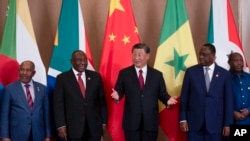The International Monetary Fund is cautioning African nations about the possibility of a regional economic downturn and the ripple effects that China's slowing economy could bring.
Africa and China have forged economic ties over the past 20 years, making the Asian giant the continent's largest trading partner. Africa exports metals, minerals and fuel to China, while importing manufactured goods and machinery from that country.
The IMF says the partnership is threatened by China's economic slowdown and aging population, trade tensions, geopolitics and the ongoing impacts of the COVID-19 pandemic.
Kenya-based businessman Adan Ibrahim, who imports vehicle parts from China, said it was difficult for a long time to access Chinese companies due to COVID-19 regulations, including visa restrictions that allowed relatively few people into the country per month.
“Up to now they have not reopened well,” Ibrahim said. “In terms of movement of people within the country, they even restricted when you travel to China. You [had to] undertake serious checks on health issues. There were … challenges, both economic and health wise."
In December 2022, China lifted coronavirus restrictions that had prevented easy movement of goods and people.
Gerrishon Ikiara, an international economics lecturer, said the economic problems faced by China and African countries affect their trade relations.
"When African economies are affected either by drought or other problems that may affect various sectors, the negative effect is felt in China,” Iriara said. “If it's … happening in China, the negative effect is felt in Africa.
“So, it's important that both the Chinese and African economies are doing well to create a more healthy trading relationship," he said.
Ibrahim said that as China shifts away from COVID-19 controls, the price of goods has increased and they go unsold.
“The goods that we used to buy with the relatively cheap prices before the COVID are now triple the price that we currently buy with,” he said.
China's economic recovery from the pandemic slowed in recent months due to a sluggish property market and weak consumer spending. China's trade data showed that exports and imports continued to decline as demand for Chinese goods waned.
Ikiara said Africa needs to find new trading partners to develop its economies.
“If the Chinese economy is slowing down, Africa needs to diversify its trading partners and to diversify either imports or exports to Asia, other parts of Africa, Latin America and the U.S.,” he said. “If there is a problem with our exports to China, we need to look for new markets.”
The IMF is urging African governments to diversify their economies, increase regional trade integration and create a favorable business environment so that local and international corporations can thrive.




